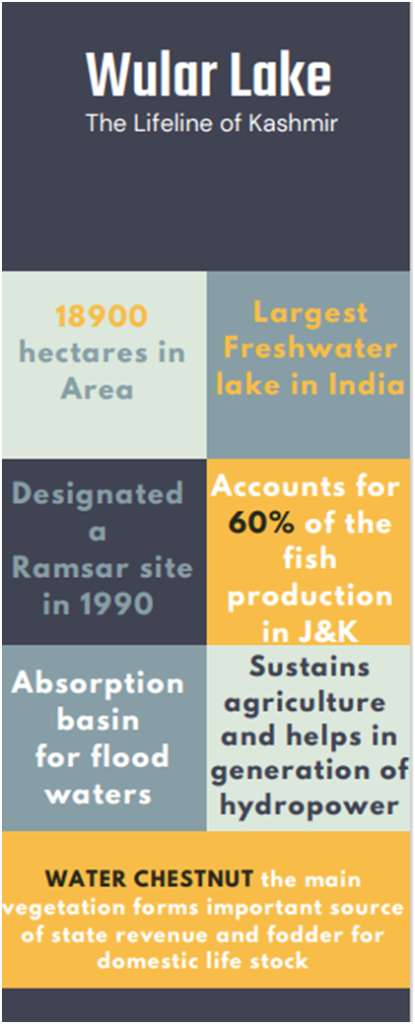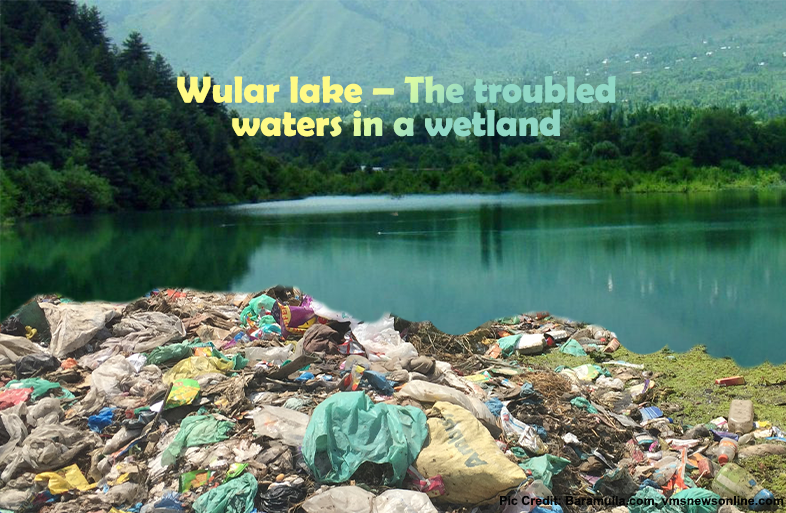The iconic Shikaras are sailing in the troubled waters. Kashmir based Ramsar site, Wular lake, an apple of tourist’s eyes and once a flourishing biodiversity hotspot, now is silently slipping into the folds of anthropogenic chaos. The haphazard dumping of untreated municipal solid waste along the banks of the lake has orchestrated the recent round of crisis.
“It all began during the COVID-19 lockdown in March 2020, when Municipal Commission (MC) Sopore started dumping the Municipal Solid waste collected from Sopore town close to the banks of Wular lake,” tells Ajaz Ahmad Dar, Member, Central Auqaf Committee, Tarzu, Sopore.
Wular lake is surrounded by 30 villages with a total population of around 3.5 lakhs and a total of 52265 households. Municipal Committee, Bandipora and Municipal committee, Sopore are the two local Civic bodies responsible for the collection, segregation and disposal of the municipal solid wastes around the area. In recent times, both the local authorities have been repeatedly called for an alleged unsustainable dumping of municipal waste leading to an existential threat to the lake and dependent ecosystem.

The Lake
Wular lake, an ox-bow lake formed by the meandering of river Jhelum, is located in the northwest districts of Bandipora and Baramulla in the Kashmir division of the UT of J&K. The lake was recognized as a wetland of national importance under Government of India Wetland Programme in 1986.
Wetlands are certain designated areas where the surrounding environment including the animal and plant life is governed by the presence of water. Occurrence of wetlands is usually witnessed at places where the water table lies close to the surface of the land or where the land is covered by skin-deep waters. Wetlands are often regarded as “Earth’s Kidneys” as apart from absorbing nitrogen and phosphorous based waste compounds, wetlands enable retention of sufficient amount of water on land which helps in flood prevention during wet years and drought occurrence during dry years.
A total of 565 lakes/wetlands are enlisted in the UT’s wetlands and water body directory, of which three also figure in the Ramsar sites list, namely Hokarsar and Wular lake from the Kashmir division and Surinsar-Mansar lakes from the Jammu division. The objective of the Ramsar list is the development and maintenance of wetlands which are crucial for the conservation of global biological diversity and sustenance of human life through the perpetuation of their ecosystems and associated beneficial processes.
On 2nd February 2022 (The International Wetlands Day) two more wetlands from India namely, Khijadia Bird Sanctuary,Gujarat and Bakhira Wildlife Sanctuary,Uttar Pradesh, got recognition as Ramsar Sites from the Ramsar Secretariat. With this, the number of Ramsar sites in India now equals 49. But beyond the jubilance rooted in the latest inclusion, the precarious state of the existing wetlands such as Wular unsettles the conservation discourse.
Confronting the crisis
Dr. Raja Muzaffar Bhat, an environment activist from the region tells The Voices, “Wular lake was designated a protected status under Ramsar Convention in the year 1990. Recent waste management practices in the area aren’t in the harmony with the vitality of site. MC Bandipora and MC Sopore have chosen Nursu Zalwan locality (north-eastern bank site) and Tarzoo (western bank site) respectively to dispose off the garbage, mannerisms of which are proven violation of the Municipal solid waste rules 2016 and the Wetland conservation rules 2017”.
Ramsar Convention is an Intergovernmental treaty adopted on 2 Feb 1971 at Ramsar, Iran. Any member country has to be a part of the collective international efforts for conservation and judicious use of wetlands. At present, 171 nations are signatories to the Ramsar Convention.

In 2012, Wular Conservation and Management Authority (WUCMA) was constituted by the government of J&K for preservation and conservation of Wular lake owing to its international importance. Mudasir Mehmood Malik, Project co-ordinator of catchment area treatment, WUCMA, in light of recent crisis, explains the basic challenge of Wular’s conservation to The Voices. He says, “Wular lake is a basin fed by river Jhelum. The solid waste disposed off in Jhelum at Srinagar eventually reaches Wular, containing which is of prime importance.” But then local waste management too holds a key.
WUCMA has been party to an intense legal tussle over the issue of closure of dumping sites near the lake. Malik tells, “A case was filed against both the MC’s for violating the Solid Waste Management rules 2016 and The Wetlands Management rules 2017 at the National Green Tribunal (NGT) in 2019 by an environmental activist Dr.Raja Muzaffar Bhat. On discovering about the same, notices were issued to the respective Municipal Committees. In 2020 WUCMA filed an affidavit before High Court of J&K regarding the dumping site at Tarzo located around the lake. This was followed by a site visit by Gita Mittal, Chief Justice of J&K High Court, who ordered closure of the site. In response to this, MC Bandipora and MC Sopore filed reports confirming closure of both the sites namely Zalwan, Bandipora and Tarzu, Sopore”.

In another communication to WUCMA, MC Bandipora informed that they are presently dumping at a site near Bandipora Bund provided by district administration Bandipora, which is some 1650 feet away from the periphery of the lake. The communication also mentioned about the collective effort being undertaken by MC and district administration to identify and develop land at Mader Kunan Bandipora as a sustainable dumping site.
Mr. Parvaiz Sajad Ganai, Additional Deputy Commissioner, Sopore, explained MC’s version on the issue to The Voices. He says, “Although the site was not that close to the lake, yet the environmentalists and WUCMA demanded its closure. Adhering to court directions we have already closed the dumping site near the lake, and have temporarily identified a site at Ningli forest range. We have placed an indent via Parivesh Portal for procurement of 19 kanals of Forest Land to be developed as a scientific land fill site.”
However, the temporarily identified site too is being challenged on various grounds. “Ningli Forest Range is just 1Km away from the previous one. The forest passage on which garbage is being dumped comes under the realm of rural development department and is a Pachayat land,” tells Ishfaq Ahmad Dar, President, Youth Forum Tarzu, Sopore. This new dumping site also has a Primary Health Centre (PHC) in its vicinity. Dr. Tanveer Hussain, PHC-Sopore tells The Voices that the dumping may trigger health issues for the locals.
Advocate Shafqat Nazir, lawyer behind PIL which inspired a site inspection by Chief Justice of High Court of J&K tells The Voices, “Ningli forest Range which is the the only Forest range with willow trees. This forest area is adjacent to the Panchayat land which forms its passage way. It also has a locality, a primary health centre, an Eidgah, paddy fields and a stream in its vicinity. In this regard, we have again filed an affidavit in the High court of J&K requesting for the closure of this site.”

Reflections beyond…
As per the State environment policy 2018 drafted by the Department of Environment, ecology and Remote Sensing ,J&K, loss of wetland ecosystems is among the key environmental challenges currently faced by the union territory. Crisis at Wular is just one of the many manifestations on roll.
Experts suggest that the encroachment is also a major reason behind the dilapidated state of wetland. Mr. Majid Farooq, scientist, Department of environment (UT of J&K) says, “Encroachment dilutes the flood retention capacity of the wetland which in turn poses a serious threat to life and property in the surrounding areas. Erratic weather patterns have further aggravated the crisis.”
He further adds, “Department of Environment has extended a range of policy interventions to ensure the conservation of wetlands which are to be implemented by the Pollution Control Boards and allied protection forces. But then the nature of these issues is such that they do not fall under the exclusive realm of any particular department which in turn makes the enforcement of regulations a tedious job.”
However, J&K pollution control board (JKPCB) considers itself as an advisory body in the equation. As per the board, presently there are 42 local bodies in the UT of J&K for the purpose of collection, segregation and disposal of Municipal solid waste. Inspite of this the problem of unsustainable dumping persists.
Dr. Sabeena, senior scientist and Incharge of Solid waste management, JKPCB confirms The Voices about the legal action. “As per the latest guidelines of NGT regarding the offences under dumping of municipal solid wastes we have fined MC Bandipora and MC Sopore with an amount of 64.21 lakh 130.46 lakh respectively, as Environment compensation fine.”
However, Dr Sabeena believes that levying fines isn’t the permanent cure for the crisis. She says, “The need is to identify the dumping sites a per the criteria laid down by the Central Pollution Control Board and set up integrated facilitities at these sites wherein the bio-degradable wastes can be processed in an auto-compost plant and the non-biodegradable waste, which is the actual cause of concern as it turns to inert waste with no treatment available so far, can be processed for recycling or reuse in a magnetic disintegrator.”
Sabeena also acknowledges the constraints in the way out. She says, “Identification of a dumping site is a difficult task as it faces resentment from all quarters of the society.”
Due to the non-availability of proper wastage disposal sites and advanced technology driven mechanisms to handle the solid waste, most of the river bodies and lakes in Kashmir have borne the impact of municipal solid waste dumping.
Dr. Arshid Jehangir, Senior Assistant Professor, Department of Environmental sciences, University of Kashmir, tells The Voices, “Mechanism of waste collection is in service but there is lack of segregation at the household level itself. In rural areas open air disposal patterns are more bizzare and concerning”. Apart from streamlining segregation at all levels be it source, collection or disposal, Dr. Jehangir assumes that there isn’t a way out except strict adherence to established legal framework by people and authorities.
As of now the dumping on the Nigli site has been discontinued. Ajaz Ahmad Dar tells The Voices, “continuous efforts have led to the closure of new dumping site near the Nigli Forest Range by the MC, Sopore. But the existing waste needs to be relocated at some appropriate site.”
As suggested by experts, sustained community-based vigilance complimented by apt legislative intervention can only infuse life into the cradles of life that these wetlands are.
Edited by NK Jha


